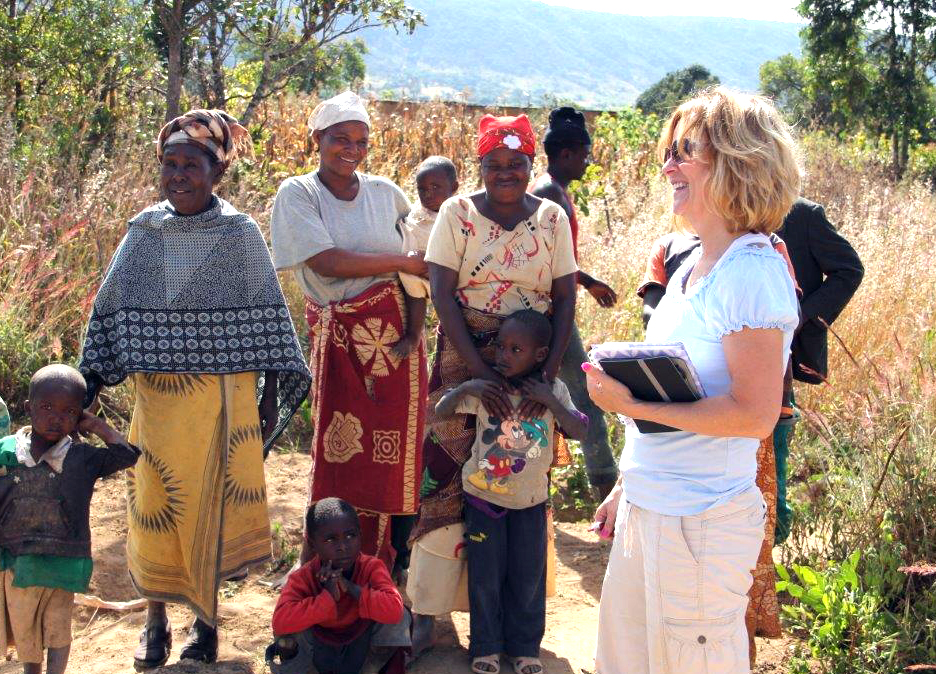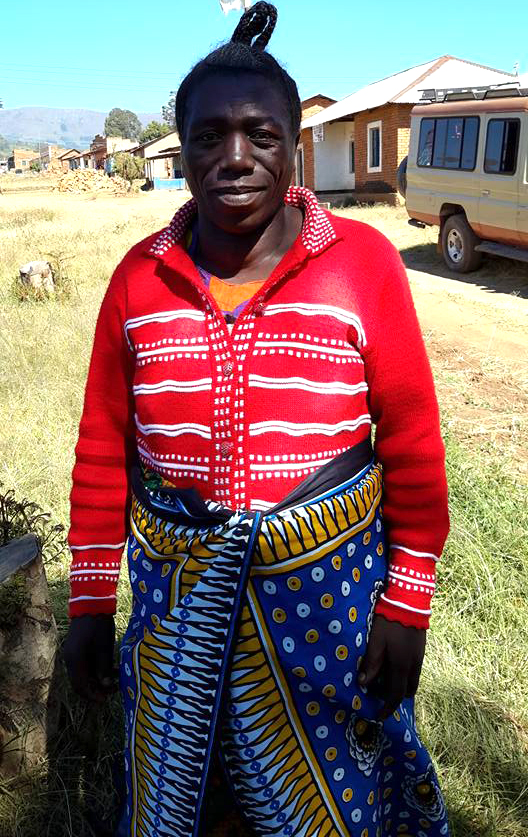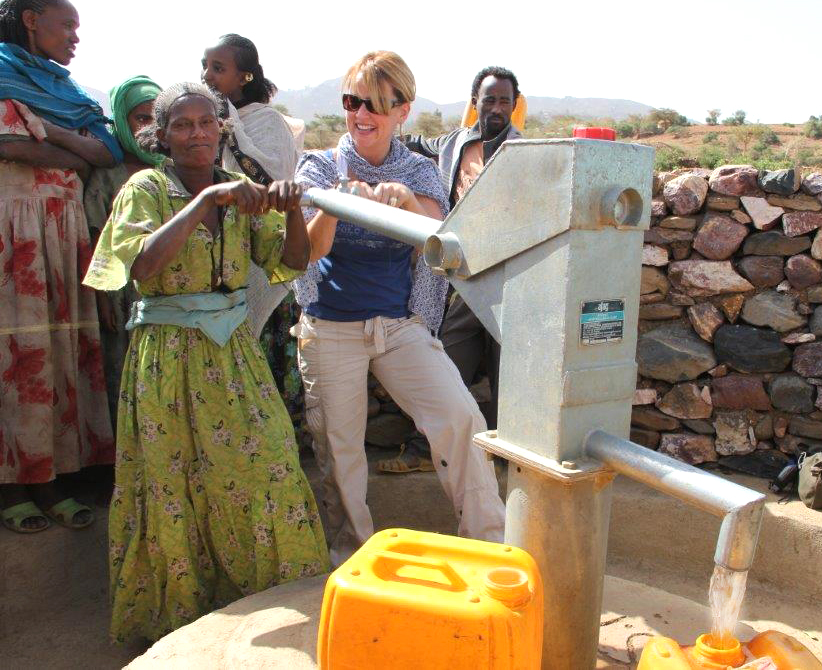Just two weeks after joining Water to Thrive, Executive Director Susanne Wilson embarked on our June mission trip with staff and supporters. Here are her thoughts on the trip.
For many who will read this, water has always been readily available from a faucet as close as the nearest bathroom or kitchen. If you are of a little older generation, you may have memories of a well and collecting water from the yard.
Yet the majority of people in the countries where we work have never witnessed water coming from a tap. Water is one of the resources most taken for granted, but in developing countries, every 90 seconds a child under 5 dies as a result of disease caused by contaminated water, poor sanitation, and unsafe hygiene practices.
The basic human rights include clean water, food, health care, and education. But all of these are jeopardized by the lack of one underlying link, water. Water to Thrive’s tagline, “Build Wells, Change Lives,” goes straight to the essence of what W2T means to the recipients of wells. In my three weeks traveling in Tanzania and Ethiopia, the stories shared from the villagers who now have access to clean water were always similar. They (especially the women and children) no longer spend the majority of their days collecting water. The children can now attend school. The women are more involved in the development of their communities. The women’s health is not as compromised by the heavy hauling of water across long distances. The girls are not as exposed to sexual predators on their way to water collection points. The community members don’t suffer illnesses associated with unclean water.

One of my most vivid memories from the recent trip to Africa is from a day that started with a two-hour, 18-mile drive, one hairpin turn after another. The W2T team arrived at the top of a very isolated mountain in Tanzania, at the village of Matamba. Villager and water committee member Julia Konga spoke very eloquently about how a well had changed her life.

Julia stressed that women are the ones who suffer most from the lack of clean, safe water. Before the well was built, she had to make a one-hour round trip to a small river. She would wake up at 3:00 a.m. to avoid the line of others waiting to collect water and to avoid contamination caused by cattle and other animals arriving at the same area. Julia mentioned that men would get to bathe and maybe the children, but the women weren’t as fortunate. When I asked her about diseases were caused by unsafe drinking water, Julia asked for a pen and paper. Her list included diarrhea, worms, typhoid, cholera, trachoma (an eye infection that can lead to blindness), and schistosomiasis (a parasitic worm living in freshwater snails). The children are the most susceptible to illnesses and many times, medical care is not adequate if available at all.

In reflecting on the work of Water to Thrive and my role as Executive Director, the comments of my friends come to mind: “You are so brave,” “what you’re doing is amazing,” “I’m so inspired by the choices you’ve made and the work you’re doing.” But I don’t feel very brave. The women and children and people who work harder than I’ve ever worked simply to have food and water for their families are the truly inspirational ones. My role is to share the impact and stories of Water to Thrive’s accomplishments. It is through the vision of others, the gifts of our supporters, and the grace of God, that Water to Thrive will grow, expand, and continue to “Build Wells and Change Lives.”
Just two weeks after joining Water to Thrive, Executive Director Susanne Wilson embarked on our June mission trip with staff and supporters. Here are her thoughts on the trip.
For many who will read this, water has always been readily available from a faucet as close as the nearest bathroom or kitchen. If you are of a little older generation, you may have memories of a well and collecting water from the yard.
Yet the majority of people in the countries where we work have never witnessed water coming from a tap. Water is one of the resources most taken for granted, but in developing countries, every 90 seconds a child under 5 dies as a result of disease caused by contaminated water, poor sanitation, and unsafe hygiene practices.
The basic human rights include clean water, food, health care, and education. But all of these are jeopardized by the lack of one underlying link, water. Water to Thrive’s tagline, “Build Wells, Change Lives,” goes straight to the essence of what W2T means to the recipients of wells. In my three weeks traveling in Tanzania and Ethiopia, the stories shared from the villagers who now have access to clean water were always similar. They (especially the women and children) no longer spend the majority of their days collecting water. The children can now attend school. The women are more involved in the development of their communities. The women’s health is not as compromised by the heavy hauling of water across long distances. The girls are not as exposed to sexual predators on their way to water collection points. The community members don’t suffer illnesses associated with unclean water.

One of my most vivid memories from the recent trip to Africa is from a day that started with a two-hour, 18-mile drive, one hairpin turn after another. The W2T team arrived at the top of a very isolated mountain in Tanzania, at the village of Matamba. Villager and water committee member Julia Konga spoke very eloquently about how a well had changed her life.

Julia stressed that women are the ones who suffer most from the lack of clean, safe water. Before the well was built, she had to make a one-hour round trip to a small river. She would wake up at 3:00 a.m. to avoid the line of others waiting to collect water and to avoid contamination caused by cattle and other animals arriving at the same area. Julia mentioned that men would get to bathe and maybe the children, but the women weren’t as fortunate. When I asked her about diseases were caused by unsafe drinking water, Julia asked for a pen and paper. Her list included diarrhea, worms, typhoid, cholera, trachoma (an eye infection that can lead to blindness), and schistosomiasis (a parasitic worm living in freshwater snails). The children are the most susceptible to illnesses and many times, medical care is not adequate if available at all.

In reflecting on the work of Water to Thrive and my role as Executive Director, the comments of my friends come to mind: “You are so brave,” “what you’re doing is amazing,” “I’m so inspired by the choices you’ve made and the work you’re doing.” But I don’t feel very brave. The women and children and people who work harder than I’ve ever worked simply to have food and water for their families are the truly inspirational ones. My role is to share the impact and stories of Water to Thrive’s accomplishments. It is through the vision of others, the gifts of our supporters, and the grace of God, that Water to Thrive will grow, expand, and continue to “Build Wells and Change Lives.”

About The Author: Water to Thrive
More posts by Water to Thrive